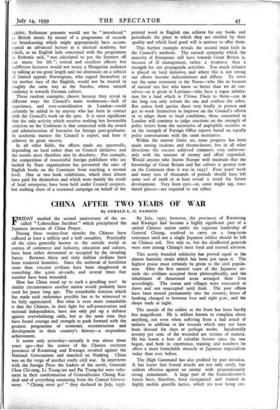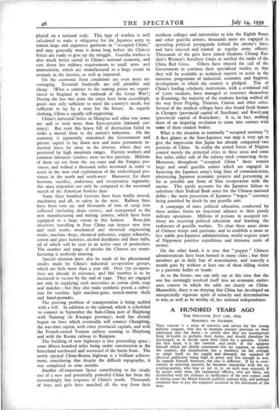CHINA AFTER TWO YEARS OF WAR
By GERALD L. G. SAMSON
FRIDAY marked the second anniversary of the so- called " Lukouchiao Incident " which precipitated the Japanese invasion of China Proper.
During these twenty-four months the Chinese have suffered at least a million and a half casualties. Practically all the cities generally known to the outside world as centres of commerce and industry, education and culture, have been either devastated or occupied by the invading forces. Between thirty and sixty million civilians have been rendered homeless. Since the outbreak of hostilities more than roo,000 civilians have been slaughtered in something like 4,000 air-raids, and several times that number have been wounded.
How has China stood up to such a gruelling test? In similar circumstances another nation would probably have sued for peace long ago. The remarkable stoicism which has made such endurance possible has to be witnessed to be fully appreciated. But what is even more remarkable is that the Chinese, in their fight for self-preservation and national independence, have not only put up a defence against overwhelming odds, but at the same time they have found courage and strength to push forward with the greatest programme of economic reconstruction and development in their country's history—a stupendous achievement.
It seems only yesterday—actually it was about three years ago—that the armies of the Chinese southern provinces of Kwantung and Kwangsi revolted against the National Government and marched on Nanking. China was on the verge of another costly civil war. In interviews with the foreign Press the leaders of the revolt, Generals Chen Chi-tang, Li Tsung-jen and Pai Tsung-hsi were vehe- ment in their condemnation of Generalissimo Chiang Kai- shek and of everything emanating from the Central Govern- ment. " Chiang must go! " they declared in July, 1936. By July, 1937, however, the provinces of Kwantung and Kwangsi had become a highly significant part of a united Chinese nation under the supreme leadership of General Chiang, resolved to carry on a long-term resistance until not a single Japanese soldier should be left on Chinese soil. Not only so, but the disaffected generals were now among Chiang's most loyal and trusted advisers.
This newly founded solidarity has proved equal to the almost fantastic strain which has been put upon it. The highest praise must certainly be given to the civil popula- tion. After the first natural scare of the Japanese air- raids the civilians accepted them philosophically, and the inhabitants of threatened areas arranged their lives accordingly. The towns and villages were evacuated at dawn and not reoccupied until dusk. The post offices have been moved permanently into the country, hours of banking changed to between four and eight p.m., and the shops trade at night.
The morale of the soldier at the front has been hardly less magnificent. He is seldom known to complain about anything, not even when suffering from a bad attack of malaria in addition to his wounds which may not have been dressed for days or perhaps weeks. Incidentally seventy per cent. of the wounded are victims of malaria. He has learnt a host of valuable lessons since the war began, and both in experience, training and numbers he offers a more formidable obstacle to Japanese imperialism today than ever before.
The High Command has also profited by past mistakes. It has learnt that frontal attacks are not only costly, but seldom effective against an enemy with preponderantly strong armaments. A large part of the Generalissimo's forces have, therefore, been reorganised and trained in highly mobile guerilla tactics, which are now being em- ployed on a national scale. This type of warfare is well calculated to make it obligatory for the Japanese army to station large and expensive garrisons in " occupied China," and may generally wear it down long before the Chinese forces are ready to give up the struggle. Guerilla warfare is also much better suited to China's national economy, and cuts down her military requirements to small arms and ammunition, which are manufactured to a large extent in arsenals in the interior, as well as imported.
On the economic front conditions are even more en- couraging. Essential foodstuffs are still plentiful and cheap. (What a contrast to the soaring prices we experi- enced in England at the outbreak of the Great War!) During the last two years the crops have been exceedingly good—not only sufficient to meet the country's needs, but sufficient to lay by a store for the future. As regards clothing, China is equally self-supporting.
China's industrial losses in Shanghai and other war zones are said to total more than $5oo,000,000 (national cur- rency). But even this heavy bill of destruction failed to strike a mortal blow to the nation's industries. On the contrary, it apparently stimulated the Government and private capital to lay down new and more permanent in- dustrial bases far away in the interior, where they are protected by high mountain ranges. Factory workers and common labourers (coolies) were no less patriotic. Millions of them set out from the sea coast and the Yangtse pro- vinces, and walked a thousand miles westward in order to assist in the now vital exploitation of the undeveloped pro- vinces in the north and south-west. Moreover, for sheer heroism, sacrifice, endurance and recuperative ingenuity, this mass migration can only be compared to the westward march of the American frontier days.
Some three hundred factories have been bodily moved, machinery and all, to safety in the west. Railway lines have been torn up, and thousands of tons of scrap iron collected (including drain covers), and transported to the new manufacturing and mining centres, which have been equipped to a large extent in this fashion. Bona-fide observers travelling in Free China can inspect new iron and steel works, mechanical and electrical engineering works, machine shops, chemical industries, copper refineries, cotton and glass factories, alcohol distilleries and flour mills, all of which will be seen in an active state of production. The number and range of articles the Chinese are manu- facturing is perfectly amazing.
Special mention must also be made of the phenomenal strides made by China's industrial co-operative groups, which are little more than a year old. Over 75o co-opera- tives are already in existence, and this number is to be increased to 10,000 by the end of 194o. They are engaged not only in supplying such necessities as cotton cloth, soap and matches ; but they also make synthetic petrol, a substi- tute for vaseline, light machine-guns, trench-mortar shells and hand-grenades.
The pressing problem of transportation is being tackled with a will. In addition to the railroad, which is scheduled to connect in September the Indo-China port of Haiphong with Nanning (in Kwangsi province), work has already begun on lines which eventually will connect Chungking, the war-time capital, with other provincial capitals, and with the French-owned Yunnan railway running to Haiphong and with the Burma railway to Rangoon.
The building of new highways is also proceeding apace ; some fifteen hundred miles being under construction in the hinterland northward and westward of the battle front. The newly opened China-Burma highway is a brilliant achieve- ment, considering that despite the difficult topography, it was completed in nine months.
Another all-important factor contributing to the steady rise of a new and potentially powerful China has been the outstandingly fine response of China's youth. Thousands of boys and girls have marched all the way from their northern colleges and universities to join the Eighth Route and other guerilla armies, thousands more are engaged in spreading political propaganda behind the enemy's lines, and have enlisted and trained as regular army officers. Thousands of the girls have joined Madame Chiang Kai- shek's Women's Auxiliary Corps or swelled the ranks of the China Red Cross. Others have obeyed the call of the Government to continue their specialised studies so that they will be available as technical experts to assist in the immense programme of industrial, economic and hygienic development to which the country is pledged. Ten of China's leading scholastic institutions, with a combined roll of 7,000 students, have managed to resurrect themselves in Kunming, the majority of the students having walked all the way from Peiping, Tientsin, Canton and other cities.
Several of the medical colleges have also found fresh homes in Chengtu (provincial capital of Szechuan) and Kweiyang (provincial capital of Kweichow). It is, in fact, nothing short of an inspiring revelation to come into contact with some of these student bodies.
What is the situation in nominally " occupied territory "? A first glance at the Sino-Japanese war map is very apt to give the impression that Japan has already conquered vast portions of China. In reality the armed forces of Nippon control merely the principal cities in these areas and some five miles either side of the railway track connecting them.
Moreover, throughout " occupied China " there remain large and small guerilla armies which are engaged in harassing the Japanese army's long lines of communication, obstructing Japanese economic projects and preventing as far as possible any form of Sino co-operation with the enemy. This partly accounts for the Japanese failure to substitute their Federal Bank notes for the Chinese national dollar ; the mere possession of Japanese " bogus " currency being punished by death by any guerilla unit.
A campaign of mass political education, conducted by these armies, forms an important adjunct to their purely military operations. Millions of persons in occupied ter- ritory are receiving political education and learning the rudiments of guerilla warfare. To clear these areas alone of Chinese troops and partisans, and to establish a more or less stable pro-Japanese administration, would require years of Nipponese punitive expeditions and immense sums of money.
On the other hand, it is true that " puppet " Chinese administrations have been formed in many cities ; but their members go in daily fear of assassination, and scarcely a month goes by without at least one of them falling victim to a patriotic bullet or bomb.
As to the future, one can only say at this time that the war has seemingly resolved itself into an economic endur- ance contest in which the odds are clearly on China. Meanwhile, there is no denying that China has developed an unexpectedly vigorous spirit of tenacity and determination to win, as well as be worthy of, her national independence.











































 Previous page
Previous page